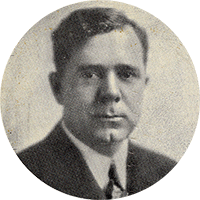Huey Pierce Long, Jr. was born on August 30, 1893, in Winnfield, a small rural community in the piney woods of north central Louisiana. He was the seventh of nine surviving children born to Caledonia Tison Long and Huey Pierce Long, Sr., a livestock farmer who built the log home in which Huey and his older siblings were born.
The Longs were fairly well-off by the standards of Winn Parish, one of the poorest parishes in a very poor state. Most frontier families lived in abject poverty, surviving on what they cultivated, with little opportunity for leisure, education, or cultural growth. Neighbors relied on one another for survival.
Little Huey was forever resisting the boundaries established to restrain him. He learned to walk at eight months and was soon discovered playing among the livestock, much to the frustration of his parents and siblings, who were always chasing after him. His father built a cover for their water well out of fear that Huey would jump in, “just to see what it was like.”

The Long family home in Winnfield, Louisiana c. 1913. The original log home where Huey was born was located nearby. ~ Courtesy of the Louisiana State Archives.
Small for his age, Huey was not like the other boys in his community, who amused themselves with outdoor activities like hunting and fishing. He disliked farm work and loved to read books, which were scarce in his community. He was intensely curious and determined to understand how things worked. When a train rolled into Winnfield, it was common for little Huey to crawl underneath it to get a closer look, delaying its departure until somebody pulled him out.
When it came to work, he preferred anything to the monotony of farm work. His jobs were many and varied, from delivering baked goods to setting newspaper type, but sales work was his favorite.
Winnfield was a stronghold of populism, a political philosophy popularized in the nineteenth century that championed the needs of the common man over the interests of corporations and the wealthy elite. Huey grew up listening to the old-timers complain about the corrupt and indifferent political establishment that ran the state and how things should be different. As a youngster, Huey had no inhibitions about chiming in and offering his own opinions.

Old Winnfield, La. - 'Main Street, North of Square, Running West' ~ Courtesy of the Louisiana Political Museum & Hall of Fame.
Remembered as “a pesterance” by one observer, Huey freely interrupted checkers games to tell grown men how to play their next move. His parents rarely scolded him for his audacity and encouraged individual expression and competition among their children.
Huey’s parents were better educated than most, and they stressed the importance of education to all of their childen. The Longs were also a deeply religious family, studying the Bible daily, attending church twice a week and never missing a gospel revival.
Huey’s mother was universally remembered as a remarkably tolerant and compassionate woman, often sending her children to the homes of less fortunate neighbors with gifts of food and clothing. Caledonia Long imbued her children with a strong sense of righteousness and fairness. In addition to her values, Caledonia appears to have passed her brilliant intellect and photographic memory to Huey.

The Long family gathered in 1913 for the funeral of Huey's mother, Caledonia Tison Long. (Huey, age 20, is seated in the first row, second from left.) Caledonia did not live to witness the remarkable achievements of her younger children. ~ Courtesy of LSU Libraries Special Collections.




